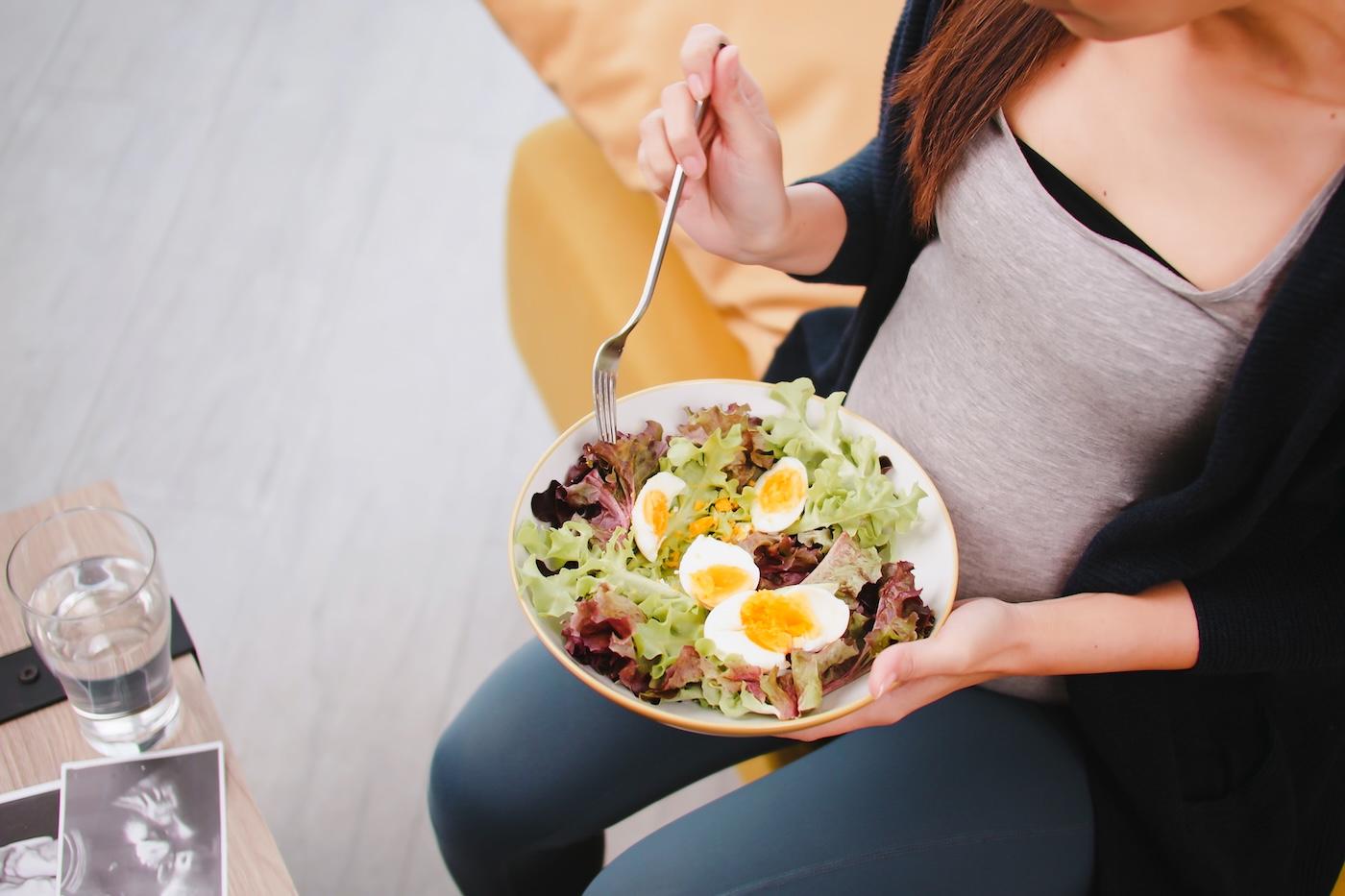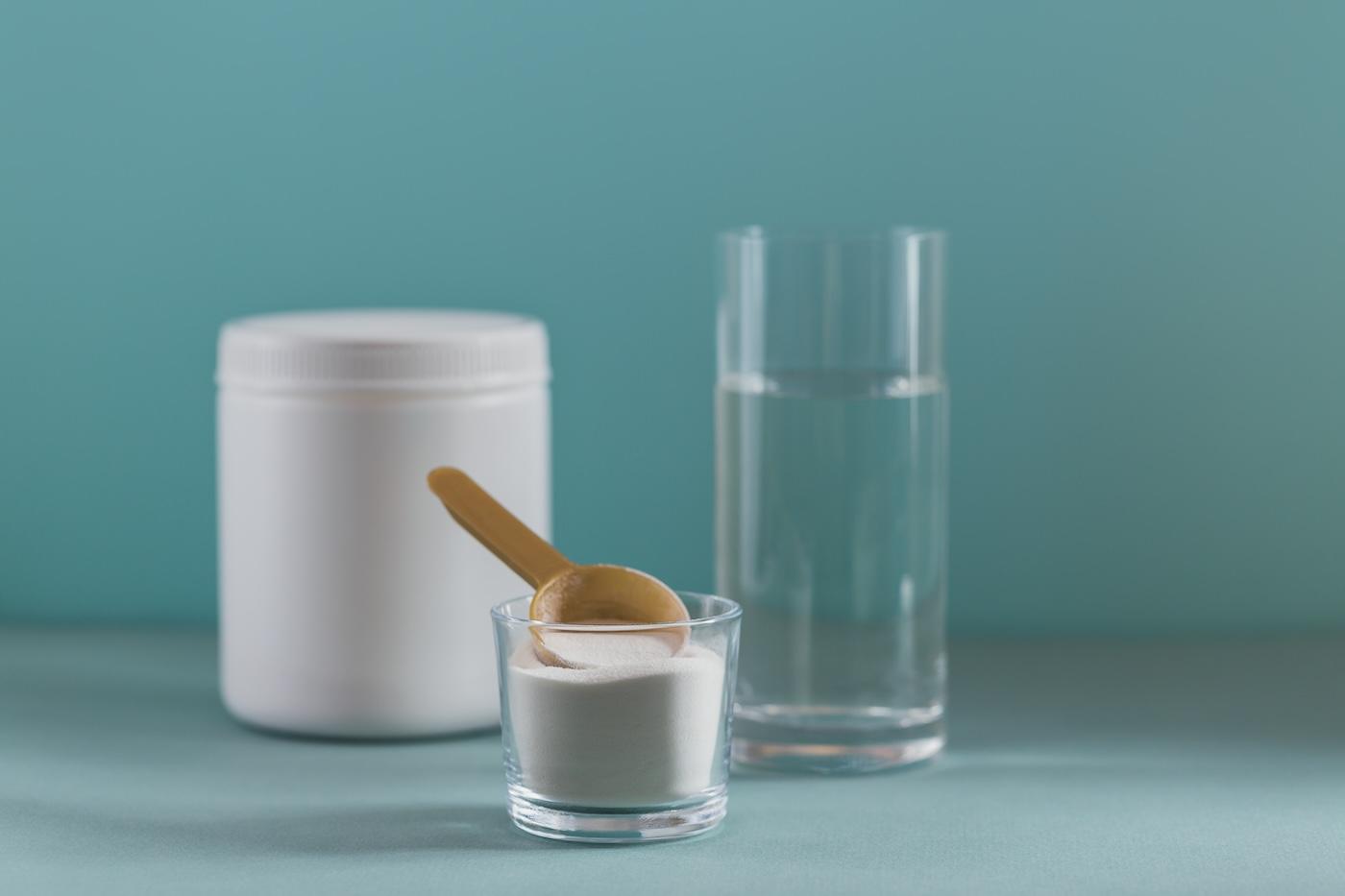PREGNANCY
Pregnancy Diet: How to Eat for a Healthy Mood
Consider adding these mood-lifting eats to your plate!

Written by
Holly Pevzner

There’s no amount of salmon, flaxseed, or leafy greens that’ll squelch pregnancy depression or anxiety. Those are serious issues that require the help of a healthcare pro. But that does not mean that what you eat during pregnancy doesn’t impact your mental wellbeing. In fact, “diet can have a profound impact on health, including mood regulation,” says Supatra Tovar, RD, PsyD, who’s both a registered dietitian and a clinical psychologist.
The only hitch is that “adopting a ‘mood boosting’ diet is not an instantaneous remedy,” she says. “But the effects of dietary changes on mood can be surprisingly swift and profound—even during pregnancy.” If you’re looking to eat your way to a better mood or morph your pregnancy diet into one that prioritizes your brain, keep reading for expert advice.
How Diet Affects Mood During Pregnancy
Food is pretty powerful. What you eat during pregnancy—and beyond—directly affects your neurotransmitters, your hormones, and a host of other biochemicals in your brain and body that are designed to help regulate your mood:
-
Food is a neurotransmitter building block. Neurotransmitters, aka tiny messengers in your brain that help it work properly, need food to function properly. “Part of that functioning is helping to regulate mood,” says Tovar. For example, the amino acid tryptophan found in oats, bananas, and seeds, is critical in the production of serotonin. “That’s the neurotransmitter that promotes feelings of well-being and happiness,” she says. - Food regulates blood sugar. “Consuming high amounts of refined sugars and carbohydrates can lead to blood sugar spikes and crashes, which can cause mood swings and irritability,” says Tovar. “On the other hand, a diet rich in whole grains and fiber helps maintain steady blood sugar levels, promoting a more stable mood.”
- Food is essential for the health of your “second brain.” The gut is often called the “second brain” for good reason: It’s thought that 95% of your body’s supply of serotonin is produced by the bacteria in your gut. “That means that a healthy gut microbiota, fostered by a diet rich in fibrous plants, fermented foods, and probiotics, can help produce mood-regulating neurotransmitters essential for mood regulation,” Tovar says.
- Food reduces depression-causing inflammation. Chronic inflammation has been linked to an increased risk of depression, according to studies. But certain dietary patterns—particularly enjoying a diet rich in antioxidants and anti-inflammatory compounds—can help reduce inflammation.
Mood-Boosting Pregnancy Diet Challenges
There are a lot of pregnancy diet “rules” and restrictions that can trip-up even the most health-focused parent-to-be…and that’s without even factoring in eating for mental health! For example, morning sickness can make it difficult to eat healthily or keep food down and conditions like gestational diabetes and preeclampsia often require specialized diets that can be tricky to adhere to without proper guidance. Plus, there’s the whole phenomenon of pregnancy cravings that may lure you to foods that wreak havoc on your mood. And pregnancy aversions could have you dodging mood-boosting eats! “The information overload that occurs in pregnancy doesn’t help either,” says Tovar. “You’re bombarded with advice on what you should and shouldn't eat in pregnancy, which can be confusing, overwhelming, and worse inaccurate.”
Foods to Boost Your Mood During Pregnancy: Fish
Pregnant folks are often skittish about eating too much fish during pregnancy, since nearly all fish contain at least some mercury. This heavy metal can be harmful to a developing baby’s brain, spine, and nervous system. But there are many good reasons to include the right amount of the right kind of fish in your pregnancy diet.
“Omega-3s not only contribute to the neurological development of your baby, but they’re essential for your brain health, reducing inflammation, and possibly lowering the risk of mood disorders,” says Tovar. For instance, studies indicate that consuming fish rich in good-for-you fatty acids may be related to a reduced risk of postpartum depression.
But because of mercury concerns, both the American College of Obstetricians and Gynecologists (ACOG) and the Food and Drug Administration (FDA) agree that it’s important to not overdo it with fish during pregnancy. Shoot for between 2 to 3 servings a week of a variety of low-mercury fish or shellfish in pregnancy. (That’s a total of 8 to 12 ounces.) Some of your best high-omega-3 / low-mercury choices include:
-
Atlantic herring - Atlantic mackerel
- Atlantic sardines (canned in oil)
- Bluefish
- Greenland halibut
- Salmon (farmed/wild Atlantic, pink salmon canned and drained)
- Skipjack tuna (canned in water)
- Striped bass
- Whitefish
- Wild rainbow trout (freshwater)
Not a fish fan? “Plant-based sources of omega-3 fatty acids, such as flaxseeds, chia seeds, and walnuts provide a safe option for mood support and overall health during pregnancy,” says Tovar. It’s important to note, however, that plant-based omegas aren’t as efficiently used by your body as those from fish sources.
Foods to Boost Your Mood During Pregnancy: Whole Grains
While whole grains won’t completely negate the mood-impact of fluctuating pregnancy hormones, chowing down on the likes of quinoa salads, overnight oats, and brown rice can work wonders at stabilizing blood sugar levels, which is “crucial for preventing mood swings and irritability,” says Tovar. Plus, blood sugar levels directly influence brain chemistry. That’s especially true for the “feel-good” neurotransmitter serotonin. In fact, “consuming complex carbohydrates can enhance serotonin production. So, next time you’re feeling queasy, it’s a good idea to trade dry white toast for dry whole wheat toast to help your morning sickness and your mood!
Foods to Boost Your Mood During Pregnancy: Fiber-Rich Foods
We already know that fiber-filled whole grains help to stabilize blood sugar levels, which work to keep mood fluctuations in pregnancy at bay, but fiber does even more for your mood in pregnancy than that. A 2022 report in the journal Nutrition notes that fiber is a key predictor of well-being in early pregnancy. Researchers speculate that this is likely due to fiber’s positive impact on gut microbiome. “Fiber feeds the beneficial bacteria in the gut, leading to a healthy balance of bacteria. That healthy balance is thought to play a role in producing serotonin, which is associated with improved mood and mental well-being,” says Tovar.
At the same time, fiber slows down gastric emptying (the rate at which food leaves your stomach), which helps you feel fuller for longer. “Fiber-rich foods are more effective than protein at staving off hangriness,” says Tovar. While “hangriness” isn’t an official complication of pregnancy, it’s not a surprising one! Not only does your body need extra calories to build a baby, research out of the Netherlands found that fluctuations in estrogen and progesterone during pregnancy naturally increases appetite, too.
Research shows that many pregnant people fall short of fiber recommendations. To get your daily dose of this super-nutrient, aim to eat 20 and 35 grams of fiber each day by filling your plate with lots of fruits, vegetables, legumes, and whole grains.
Foods to Boost Your Mood During Pregnancy: Water
Water isn’t technically a “food,” but that doesn’t make it any less crucial to pregnancy and mood…especially since the risk of dehydration during pregnancy is “relatively high.” The brain is about 73% water, which means “even mild dehydration can impair concentration, alertness, short-term memory—and cause frustration, irritability, and mood swings,” says Tovar. So, on the flip, staying properly hydrated in pregnancy “plays a crucial role in maintaining cognitive function, which is directly connected to mood,” says Tovar.
During pregnancy, ACOG recommends drinking 64 to 96 ounces (or 8 to 12 cups) of water every day. It’s a good idea to add hydrating foods, like strawberries, spinach, zucchini, plain yogurt, and eggs into the mix, too. (Learn more on the importance of hydration in pregnancy.) As a big time water-in-pregnancy perk: Proper hydration is key to maintaining amniotic fluid, building new tissue, and staving off pregnancy hemorrhoids.
Foods to Boost Your Mood During Pregnancy: Nuts and Seeds
You’d be hard pressed to find a nut or seed that’s not great for your body and brain in pregnancy. Beyond being chock-full of mood-lifting omega-3s and fiber, almonds, cashews, flax, and chia seeds are also great sources of magnesium, which is crucial to the production of serotonin.
“Magnesium helps regulate the body’s stress-response, which means it can have a calming effect,” says Tovar. (What parent-to-be doesn’t need that?!) Not to be outdone, chestnuts, hazelnuts, pistachios, and walnuts, are go-tos for vitamin B6, which supports neurotransmitter synthesis and mood, says Tovar.
As a bonus, nearly all nuts contain folate, the natural version of vitamin B9 (aka folic acid). “Folate is yet another crucial nutrient for mood regulation,” says Tovar. Since the body only absorbs about 50% of available folate, folic acid supplements are still key in pregnancy, but aiming to eat plenty of folate-rich foods is a smart move, too. (Learn more about the importance of folic acid in pregnancy.)
For the most bang for your bite, know that hemp, sunflower, and pumpkin seeds are all very high in magnesium, B6, and folate, which is fantastic since the near magical combo of fiber, magnesium, and B vitamins plays a key role in “shaping the mental health status of women in pregnancy,” according to Irish researchers.
Foods To Boost Your Mood During Pregnancy: Leafy Greens
It’s a good bet that your pregnancy cravings are more Ben & Jerry’s than spinach and arugula, but research shows that the latter is better equipped to offer the mood lift you’re looking for. Dark green leafies like spinach, kale, and arugula, are not only anti-inflammatory foods, they’re bursting with mood-helping B vitamins, fiber, and folate. In addition, they’re super-rich in antioxidants, like beta-carotene, vitamin C, and vitamin E that help to relieve stress and improve emotion regulation. (Antioxidants do this by helping get rid of free radicals, which are atoms that cause damage to the cells, DNA, and proteins in your body.) At the same time, loading up on antioxidant-rich foods helps to create new neurons in the part of your brain that helps you manage emotions and mood. Craving more antioxidants? Add strawberries, avocado, sliced pecans, carrots, and bell peppers to your salad. Each one is an antioxidant powerhouse.
Foods to Boost Your Mood During Pregnancy: Beans and Legumes
While not quite “happy pills,” wee beans and legumes are pretty darn close in look and effect! They are super-healthy plant-based proteins, which keeps you feeling fuller longer, staving off hangry pregnancy emotions. Plus, they're fiber-filled, which helps to prevent your pregnancy moods from roller-coastering—and their fiber adds to a healthy gut microbiome that has been associated with improved mood and mental health. But the mood-boosting benefits don’t stop there!
Beans and legumes are teeming with micronutrients like folate and magnesium, which are important for brain health and mood regulation. And if you are like roughly 50% of moms-to-be who are deficient in iron, adding beans and legumes to your diet can help buoy your numbers—and your mood. That’s because iron deficiency in pregnancy can easily lead to anemia with its telltale mood symptoms, like irritability, difficulty concentrating, and fatigue. (Anemia in pregnancy puts you at risk for pregnancy complications, such as preterm birth, low birth weight baby, even postpartum depression.)
While your body absorbs two to three times more iron from animal sources than from plants, it’s still worth it to keep beans and legumes in heavy rotation, simply pairing them with items rich in vitamin C, like citrus fruits, bell peppers, and tomatoes, to aid absorption. You can cook your beans and legumes in cast iron pots and pans. Research shows that this’ll increase the iron content for foods. (Learn more about the importance of iron in pregnancy.)
Final Thoughts on Mood-Boosting Pregnancy Foods
The best pregnancy diet for mood really comes down to enjoying a variety of whole foods above all else. A 2022 report even shows that a higher intake of whole grains, produce, fish, and nuts—along with a lower intake of red meat and sweets—is associated with a better mental health during pregnancy.
“By focusing on a whole-food, plant-heavy diet during pregnancy, you help ensure a good supply of the nutrients necessary for brain function, it supports a healthy gut microbiome, stabilizes blood sugar levels, and reduces inflammation—all of which contribute to better mood regulation and overall well-being,” says Tovar.
More on Pregnancy, Motherhood & Mental Wellbeing
- Pregnancy Insomnia & Mental Health
- The Happiest Baby Postpartum Mental Wellness Toolkit
- 5 Ways SNOO Supports Parents’ Wellbeing
- Depression During Pregnancy—What Parents-to-Be Need to Know
- Dealing With Gender Disappointment: a Judgment-Free Guide
***
REFERENCES
- Sutter Health: Eating Well for Mental Health
- The Role of Inflammation in Depression and Fatigue. Frontiers in Immunology. July 2019
- UW Medicine: 3 Mood Boosting Foods to Reduce Inflammation and Stress.
- Dietary intake of fish and n-3 polyunsaturated fatty acids and risk of postpartum depression: a nationwide longitudinal study – the Japan Environment and Children's Study (JECS). Psychological Medicine. October 2020
- American College of Obstetricians and Gynecologists (ACOG): Nutrition During Pregnancy
- Cleveland Clinic: How To Pick Fish High in Omega-3 and Low in Mercury
- National Institutes of Health Office of Dietary Supplements: Omega-3 Fatty Acids
- Diet and mental health in pregnancy: Nutrients of importance based on large observational cohort data. Nutrition. April 2022
- A Brief Review on How Pregnancy and Sex Hormones Interfere with Taste and Food Intake. Chemosensory Perception. March 2010
- High-Fiber Diet during Pregnancy Characterized by More Fruit and Vegetable Consumption. Nutrients. January 2021
- UCFS: Eating Right Before and During Pregnancy
- Associations between hydration state and pregnancy complications, maternal-infant outcomes: protocol of a prospective observational cohort study. BMC Pregnancy and Childbirth. February 2020
- USGS: The Water in You: Water and the Human Body
- ACOG: How much water should I drink during pregnancy?
- Harvard T.H. Chan: Folate (Folic Acid) – Vitamin B9
- Suboptimal iron deficiency screening in pregnancy and the impact of socioeconomic status in a high-resource setting. Blood Advances. November 2021
- The association between anemia and postpartum depression: A systematic review and meta-analysis. Caspian Journal of Internal Medicine. Spring 2019
- Iron-containing cookware for the reduction of iron deficiency anemia among children and females of reproductive age in low- and middle-income countries: A systematic review. PLOS One. September 2019
- Associations of Mediterranean diet with psychological ill-being and well-being throughout the pregnancy course: The GESTAFIT project. Quality of Life Research. March 2022
Disclaimer: The information on our site is NOT medical advice for any specific person or condition. It is only meant as general information. If you have any medical questions and concerns about your child or yourself, please contact your health provider.
SHARE THIS ARTICLE
MOST LOVED
Sleepytime Sidekicks
More on Pregnancy
About Holly Pevzner
Holly Pevzner is Happiest Baby’s Staff Writer. She specializes in creating parenting, pregnancy, health, nutrition, and family travel content. Her work—including essays, columns, reported features, and more—has appeared in outlets such as EatingWell, Family Circle, Parents, Real Simple, and The Bump. Before becoming a full-time writer, Holly held senior staff positions at Prevention, Fitness, and Self magazines, covering medical health and psychology. She was also a contributing editor at Scholastic Parent & Child magazine and a regular kids-health columnist for Prevention and First For Women magazines. Holly lives in Los Angeles with her husband, two boys, and terrier mix.












